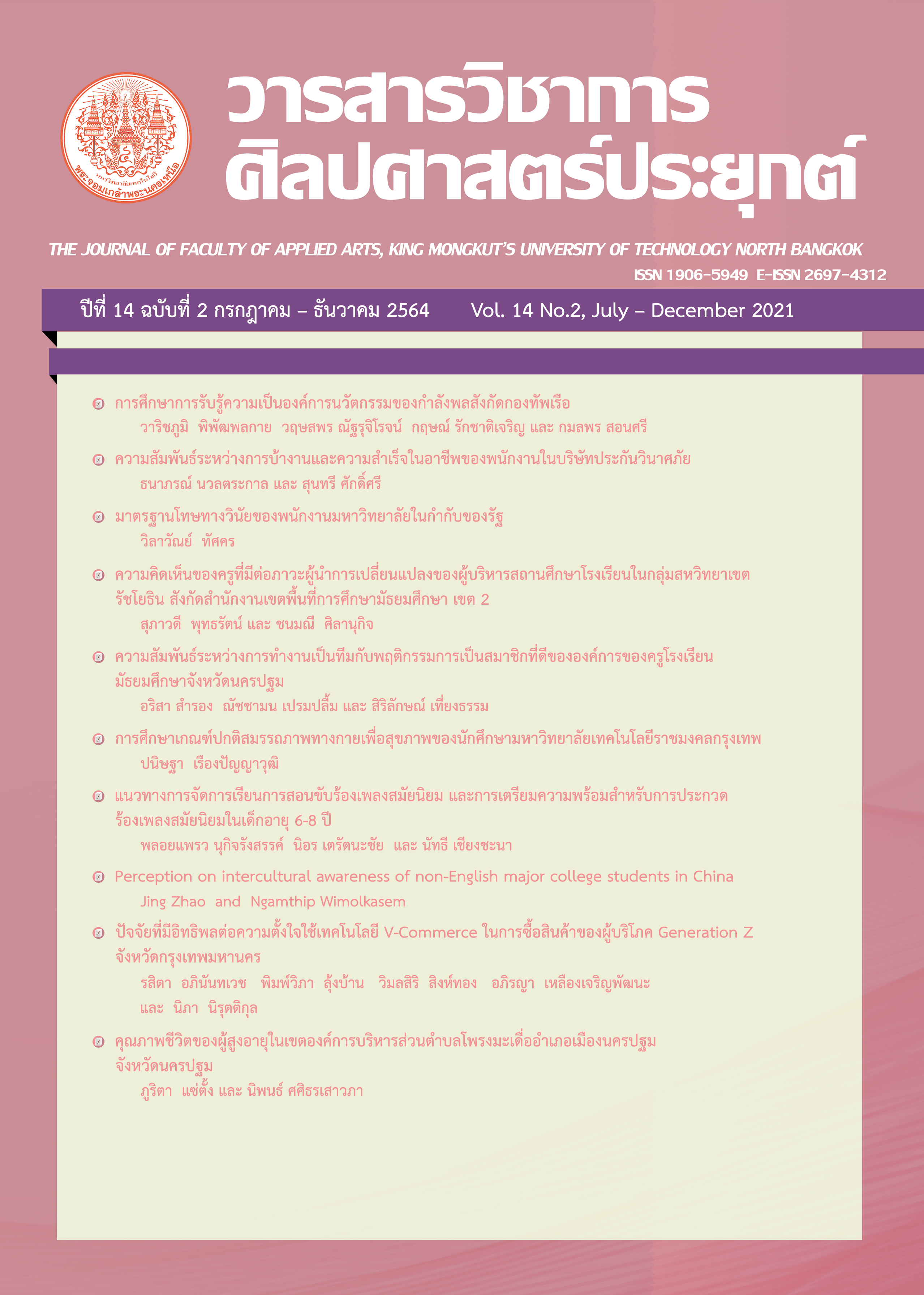ความสัมพันธ์ระหว่างการทำงานเป็นทีมกับพฤติกรรมการเป็นสมาชิกที่ดีขององค์การ ของครูโรงเรียนมัธยมศึกษาจังหวัดนครปฐม
Main Article Content
บทคัดย่อ
การวิจัยครั้งนี้มีวัตถุประสงค์เพื่อ 1) ศึกษาการทำงานเป็นทีมและพฤติกรรมการเป็นสมาชิกที่ดีขององค์การของครูโรงเรียนมัธยมศึกษาจังหวัดนครปฐม 2) เปรียบเทียบพฤติกรรมการเป็นสมาชิกที่ดีขององค์การของครูโรงเรียนมัธยมศึกษาจังหวัดนครปฐม จำแนกตามปัจจัยส่วนบุคคล และ 3) ศึกษาความสัมพันธ์ระหว่างการทำงานเป็นทีมกับพฤติกรรมการเป็นสมาชิกที่ดีขององค์การของครูโรงเรียนมัธยมศึกษาจังหวัดนครปฐม กลุ่มตัวอย่างที่ใช้ในการวิจัยในครั้งนี้ คือ ครูโรงเรียนมัธยมศึกษาจังหวัดนครปฐม จำนวน 338 คน เครื่องมือที่ใช้ในการวิจัย คือ แบบสอบถามเกี่ยวกับข้อมูลทั่วไป แบบวัดพฤติกรรมการเป็นสมาชิกที่ดีขององค์การ และแบบวัดการทำงานเป็นทีม สถิติที่ใช้ในการวิเคราะห์ข้อมูล ได้แก่ ค่าร้อยละ ค่าเฉลี่ย ค่าเบี่ยงเบนมาตรฐาน สถิติทดสอบหาความแตกต่างค่าที (Independent Sample t-test) และสถิติทดสอบ ความแปรปรวนทางเดียว (One Way ANOVA) และค่าสัมประสิทธิ์สหสัมพันธ์แบบเพียร์สัน (Pearson’s Product Moment Correlation Coefficient) ผลการวิจัยพบว่า 1) ครูโรงเรียนมัธยมศึกษาจังหวัดนครปฐมที่เป็นกลุ่มตัวอย่างมีพฤติกรรมการเป็นสมาชิกที่ดีขององค์การ และการทำงานเป็นทีมโดยรวมอยู่ในระดับสูง 2) ครูโรงเรียนมัธยมศึกษาจังหวัดนครปฐมที่มีเพศต่างกัน มีพฤติกรรมการเป็นสมาชิกที่ดีขององค์การไม่แตกต่างกัน 3) ครูโรงเรียนมัธยมศึกษาจังหวัดนครปฐมที่มีระดับการศึกษาและประสบการณ์การทำงานต่างกัน มีพฤติกรรมการเป็นสมาชิกที่ดีขององค์การแตกต่างกัน อย่างมีนัยสำคัญทางสถิติที่ระดับ .05 4) การทำงานเป็นทีมมีความสัมพันธ์ทางบวกกับพฤติกรรมการเป็นสมาชิกที่ดีขององค์การของครูโรงเรียนมัธยมศึกษาจังหวัดนครปฐม อย่างมีนัยสำคัญทางสถิติที่ระดับ .05 โดยด้านที่มีความสัมพันธ์ทางบวกกับพฤติกรรมการเป็นสมาชิกที่ดีขององค์การมากที่สุดคือ ด้านทีมงานมีเป้าหมายที่ชัดเจนซึ่งสมาชิกในทีมให้การยอมรับร่วมกัน รองลงมาคือ ด้านบรรยากาศภายในทีมมีความไว้วางใจต่อกัน ด้านทีมงานมีความร่วมมือในการตัดสินใจ ด้านทีมงานมีการสื่อสารที่เปิดเผยจริงใจ ด้านสมาชิกทุกคนมีส่วนร่วมในกิจกรรมของทีม ด้านทีมงานมีความรู้สึกเป็นเจ้าของทีม และด้านสมาชิกมีทักษะการฟังที่ดี
Article Details

อนุญาตภายใต้เงื่อนไข Creative Commons Attribution-NonCommercial-NoDerivatives 4.0 International License.
1.บทความที่ตีพิมพ์เป็นลิขสิทธิ์ของวารสารวิชาการศิลปศาสตร์ประยุกต์ การนำเนื้อหา ข้อความหรือข้อคิดเห็น รูปภาพ ตาราง ของบทความไปจัดพิมพ์เผยแพร่ในรูปแบบ ต่าง ๆ เพื่อใช้ประโยชน์ในเชิงพาณิชย์ ต้องได้รับอนุญาตจากกองบรรณาธิการวารสารอย่างเป็นลายลักษณ์อักษร
2.ข้อความที่ปรากฏในบทความแต่ละเรื่อง เป็นความคิดเห็นส่วนตัวของผู้เขียนแต่ละท่านไม่เกี่ยวข้องกับวารสารวิชาการศิลปศาสตร์ประยุกต์ และบุคลากร คณาจารย์ท่านอื่น ๆ ในวารสารฯ แต่อย่างใด ความรับผิดชอบองค์ประกอบทั้งหมดของบทความแต่ละเรื่องเป็นของผู้เขียนแต่ละท่าน หากมีความผิดพลาดใด ๆ ผู้เขียนแต่ละท่านจะรับผิดชอบบทความของตนเองแต่ผู้เดียว
เอกสารอ้างอิง
กระทรวงศึกษาธิการ. (2561). แผนปฏิบัติราชการประจำปีงบประมาณ พ.ศ.2561. สืบค้นจาก http://www.reo2. moe.go.th/home/index.php/site-map/2018-10-30-09-31-43/2019-07-10-08-02-58/2561
กัลยรักษ์ วิริยมาโน. (2563). การทำงานเป็นทีมที่ส่งผลต่อพฤติกรรมการเป็นสมาชิกที่ดีต่อองค์การของบุคลากรโรงพยาบาล. สืบค้นจาก https://moodrmoo.files.wordpress.com/2014/10/sif11-21st-century-skills-1.pdf
ตะวัน เทวอักษร. (2555). สร้างทักษะให้ผู้เรียนพร้อมสู่ศตวรรษที่ 21. สืบค้นจากhttps://moodrmoo.files.wordpress. com/2014/10/sif11-21st-century-skills-1.pdf
ทัศนา เจนวณิชสถาพร. (2553). ความสัมพันธ์ระหว่างการรับรู้การสนับสนุนจากองค์การ การมองโลกในแง่ดี และการรับรู้พฤติกรรมการเป็นสมาชิกที่ดีขององค์การ : กรณีศึกษาหน่วยงานในกำกับของรัฐแห่งหนึ่ง (งานวิจัยส่วนบุคคลปริญญามหาบัณฑิต). มหาวิทยาลัยธรรมศาสตร์, กรุงเทพมหานคร.
ทิพย์วิมล จรลี. (2558). บุคลิกภาพห้าองค์ประกอบ ความสามารถในการเผชิญและฟันฝ่าอุปสรรค และการรับรู้พฤติกรรมการเป็นสมาชิกที่ดีขององค์การของพนักงานกลุ่มบริษัทผู้ผลิตไฟฟ้าขนาดเล็กแห่งหนึ่ง (งานวิจัยส่วนบุคคลปริญญามหาบัณฑิต). มหาวิทยาลัยธรรมศาสตร์, กรุงเทพมหานคร.
ทวีศักดิ์ จินดานุรักษ์. (2560). ครูและนักเรียนในยุคการศึกษาไทย 4.0. สืบค้นจาก https://e-jodil.stou.ac.th/ filejodil/16_2_603.pdf
บุญชม ศรีสะอาด. (2553). การวิจัยเบื้องต้น (พิมพ์ครั้งที่ 8). กรุงเทพมหานคร: สุวีริยาสาส์น
ปิ่นกนก วงศ์ปิ่นเพ็ชร์. (2561). พฤติกรรมบุคคลในองค์การ. กรุงเทพมหานคร: ศูนย์ผลิตตำราเรียน มหาวิทยาลัยเทคโนโลยีพระจอมเกล้าพระนครเหนือ.
พิชิต ฤทธิ์จรูญ. (2544). การวิจัยเพื่อพัฒนาการเรียนรู้: การปฏิบัติการวิจัยในชั้นเรียน (พิมพ์ครั้งที่ 2). กรุงเทพมหานคร: สถาบันติวปี้ก.
รัตติกรณ์ จงวิศาล. (2551). มนุษยสัมพันธ์: พฤติกรรมมนุษย์ในองค์การ. กรุงเทพมหานคร: สำนักพิมพ์มหาวิทยาลัย เกษตรศาสตร์.
วิจารณ์ พานิช. (2556). วิถีสร้างการเรียนรู้เพื่อศิษย์ (พิมพ์ครั้งที่ 3). กรุงเทพมหานคร: ฝ่ายโรงพิมพ์ บริษัท ตถาตา พับลิเคชั่น.
ศศิวิมล อุปนันไชย. (2551). ความสัมพันธ์ระหว่างบุคลิกภาพแบบห้าองค์ประกอบ ความสามารถในการเผชิญและฟันฝ่าอุปสรรค และพฤติกรรมการเป็นสมาชิกที่ดีขององค์การ : กรณีศึกษาในสำนักงานอธิการบดีของมหาวิทยาลัยแห่งหนึ่ง (งานวิจัยส่วนบุคคลปริญญามหาบัณฑิต). มหาวิทยาลัยธรรมศาสตร์, กรุงเทพมหานคร.
สถาบันส่งเสริมการสอนวิทยาศาสตร์และเทคโนโลยี. (2563). การให้ความช่วยเหลือและสนับสนุนของครูส่งผลต่อผลการประเมินด้านการอ่านของนักเรียนอย่างไร. สืบค้นจาก https://library.ipst.ac.th/bitstream/ handle/ipst/6406/ 57Focus_in_PISA_Vol.57.pdf?sequence =1&isAllowed=y
สุทัศน์ ภูมิภาค. (2562). หน้าที่และคุณลักษณะ ของคุณครู ในร่างพรบ.การศึกษาฉบับใหม่. สืบค้นจาก https://www. kruupdate.com/20705/.
อคัมย์สิริ ลียาชัย. (2555). บุคลิกภาพห้าองค์ประกอบ ความฉลาดทางอารมณ์ และพฤติกรรมการเป็นสมาชิกที่ดีขององค์การ: กรณีศึกษาพนักงานบริษัทคอมพิวเตอร์แห่งหนึ่งในกรุงเทพมหานคร (งานวิจัยส่วนบุคคลปริญญามหาบัณฑิต). มหาวิทยาลัยธรรมศาสตร์, กรุงเทพมหานคร.
Apaydin, C., and Sirin, H. (2016). The Relationship between Organizational Citizenship Behavior, Group Cohesiveness and Workplace Deviance Behavior of Turkish Teachers. Retrieved from http://www.ccsenet.org/journal/index.php/ies/article/view/58721
Arefi, M., Shohodi M., and Zandi KH. (2012). The Correlation between Organizational Citizenship Behavior and Teamwork: A case study of Kurdistan university employees. Retrieved from https://www.sid.ir/ en/journal/ViewPaper.aspx?id=280879
Clegg, S. R., Hardy, C., and Nord, W. R. (1996). Handbook or Organization Studies. London: SAGE.
Cooper, J. D. (2010). Collective Efficacy OCB and School Effectiveness in Alabama Public High Schools. (Unpublished doctoral dissertation). The University of Alabama, Alabama.
Demir, K. (2015). Teachers' organizational citizenship behaviors and organizational identification in public and private preschools. Procedia - Social and Behavioral Sciences, 174,176 – 1182.
DiPaola, M. F., and Hoy, K. W. (2005). School Characteristics that Foster Organizational Citizenship Behavior. Retrieved from http://www.researchgate.net/publication/234650814_School
DiPaola, M. F., and Neves, P. M. M. (2009). Organizational Citizenship Behavior in American and Portugese Public Schools. Retrieved from https://www.emerald.com/insight/content/ doi/10.1108/095782309 10967464/full/html
DiPaola, M.F. and Tschannen-Moran, M. (2001). Organizational Citizenship Behavior in Schools and Its Relationship to School Climate. Journal of School Leadership, 174, 424-447. Retrieved from https://doi.org/10.1177/105268460101100503
Duygulu, E., and Ciraklar, N. (2008). Team Effectiveness and Leadership Roles. Retrieved from https:// mpra.ub.uni-muenchen.de/7245/1/MPRA_paper_7245.pdf
George, J. M., and G. R. Jones. (2002). Understanding and Managing Organizational Behavior (3rd ed.). New Jersey: Prentice-Hall.
Greenberg, J., and Baron, R. A. (2003). Behavior in Organizations: Understanding and Managing the Human Side of Work (8th ed.) New Jersey: Prentice.
Hemakumara, M. G. G., Khatibi, A. A., and Johar, M. G. M. (2019). Job Satisfaction and Organizational Citizenship Behavior among the Administrative Staff of State Universities in Sri Lanka. Retrieved from https://www.researchgatenet/ publication/329737436_Job_
Kegans, L., McCamey, R.B., and Hammond, H. (2012). Organizational Citizenship Behavior and Work experience. Retrieved from https://pubmed.ncbi.nlm.nih.gov/22989225
Lai, J.Y.M., Lam, L.W. and Lam, S.S.K. (2013). Organizational citizenship behavior in work groups: A team cultural perspective. Retrieved from https://onlinelibrary.wiley.com/doi/abs/10.1002/job.1840
Law, K. S., Wong, C. S., and Chen, Z. X. (2005). The construct of organizational citizenship behavior: Should we analyze after we have conceptualized. In Turnipseed, D. L. (Ed.), Handbook of organizational citizenship behavior (pp. 47–65). New York: Nova Science Publishers Inc.
Mohammed, A.K. and Al-Hawary, S.I.S. (2017). Impact of Team Work Traits on Organizational Citizenship Behavior from the Viewpoint of the Employees in the Education Directorates in North Region of Jordan. Retrieved from https://journalofbusiness.org/index.php/GJMBR/article/download/2193/2095
Moorhead, G., and Griffin, W. R. (2010). Organizational behavior : managing people and organizations (9th ed.) Boston: South-Western.
Nawaz, N. and Gomes, A.M. (2018). Organizational citizenship behavior and team performance: a multiple
level study in Indian higher education institutions. Retrieved from https://businessperspectives. org/ images/pdf/applications/publishing/templates/article/assets/10906/PPM_2018_03_Nawaz.pdf
Newstrom, J. W. and Davis, K. (1997). Organizational behavior: Human behavior at work (10th ed.) New York: McGraw-Hill.
Oplatka, I. (2006). Going Beyond Role Expectations: Toward an Understanding of the Determinants and Components of Teacher Organizational Citizenship Behavior. Retrieved from https://doi.org/ 10.1177/0013161X05285987
Organ, D. W. (1990). The Motivational Basis of Organizational Citizenship Behavior. Retrieved from https:// www.academia.edu/998116/The_motivational_basis_of_organizational_citizenship_Behavior
Organ, D. W. (1997). Organizational citizenship behavior: It's construct clean-up time. Retrieved from https://10.1207/s15327043hup1002_2
Organ, D. W., and Ryan, K. (1995). A meta-analytic review of attitudinal and dispositional predictors of organizational citizenship behavior. Personnel psychology, 48(4), 775-802.
Pepe, A., Addimando, L., and Veronese, G. (2017). Measuring Teacher Job Satisfaction: Assessing Invariance in the Teacher Job Satisfaction Scale (TJSS) Across Six Countries. Europe’s Journal of Psychology, 13(3), 396-416. Retrieved from doi:10.5964/ejop.v13i3.1389
Podsakoff, P. M., et al. (2000). Organizational citizenship behaviors: A critical review of theoretical and empirical literature and suggestions for future research. Journal of Management, 26(3), 523-563.
Salm, L. J., Hoegl, M., and Muethel, M. (2017). How Attitudes affect Teamwork and Citizenship Behavior (differently) in the East and in the West. Retrieved from http://journalsaom.org/doi/abs/10.5465
Somech, A. and Ron, I. (2007). Promoting organizational citizenship behavior in schools: the impact of individual and organizational characteristics. Educational Administration Quarterly, 5, 1-29.
Stovernick, A. C., Chiaburu, D. S., Li, N., and Zheng, X. (2017). Supporting Team Citizenship: The Influence of Team Social Resources on Team -Level Affiliation-Oriented and Challenge-Oriented Behavior. Human Resources Management Journal, 28, 201-215.
Talebloo, B., Basri, R., Asmiran, S., and Hassan, A. (2015). Teachers’ Perceptions on Transformational Leadership Based on Demographic Differences. Retrieved from https://pdfs.semanticscholar .org/ae36/c329ae75f0b1bb46151a5058130f98aa629c.pdf
Thompson, L. L. (2015). Making the Team: A Guides for Managers (6th ed.). Boston: Pearson Education
West, M. A. (2012). Effective teamwork: Practical Lessons from Organizational Research (3rd ed.). Malden, MA: John Wiley & Sons.
Yamane, T. (1973). Statistics: An Introductory Analysis (3rd ed.). New York: Harper and Row.


